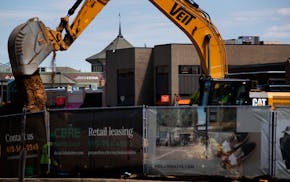It wasn't a traditional canvas by any means, but to photographer Debora Anne Miller, her art installation couldn't have been better.
Her photos flickered across the giant Gold Medal Flour silos as the sun went down on the banks of the Mississippi River, bridging two sides of a city and creating art in which people could not only view but also participate in.
"She was trying to change the way people see things and experienced things," said her husband, Andy McQuigg.
Miller, of Minneapolis, died of breast cancer on Feb. 28 after a six-year battle with the disease. She was 46.
She was born in Portland, Maine, as a twin in a large family, and raised largely in Utah, Idaho and Washington. Art was an early influence, said Miller's twin sister, Rebecca Miller. Their father took photos and painted, and their mother quilted.
When their parents divorced, the Miller children spent several summers with their father in Minneapolis. Using her father's 35mm camera, Debora Miller spent her first time behind the lens, taking portraits of friends and neighbors under her father's guidance, her sister said.
In 1984, she graduated from Wallace High School in Idaho and went on to study international relations at Macalester College in St. Paul, practicing photography all the while.
After moving to Minneapolis, Miller met McQuigg when she hired him to work at the New Riverside Cafe. Miller and McQuigg, a potter, soon decided to share a warehouse space in northeast Minneapolis, where they experimented with art.
"I think that was sort of the beginning of her thinking outside just traditional photography," McQuigg said.
They got married in 1992. In 2000, she gave birth to their son, Roan, whom she liked to call her "magnum opus," McQuigg said.
As an artist, Miller experimented with both analog and digital photography. She was interested in the effects of light and the ways art could be experienced. Her subjects were often everyday items and landscapes such as electrical towers or snow-covered steps that others may pass without a pause, but the way she presented them made people look at them differently, McQuigg said.
"She had a sense of design and framing that was really remarkable," he said. "She was able to see what you might think of as ordinary objects in different ways."
One way of presenting her work was with projection.
"This interest goes back a long ways, and likely finds its ultimate source in the simple act of looking through a loupe at a slide on a light table," Miller wrote in a blog post last year. "As you lower your eye toward the loupe — and away from the world — scale, context, surroundings all fall away in the visual crush of light doing its work."
One major work was a large-scale interactive projection called "MURMUR," in which her photos were projected on grain silos during the 2011 Northern Spark festival. Participants could select the photos being projected.
Miller was outgoing and humble. Throughout her battle with cancer, she remained positive, her sister Rebecca Miller said. "She was like, 'I'm not going to let it define my world view.' "
In addition to her husband and son, she is survived by her parents, Martha Calabretta and Joseph Miller IV, and stepparents, Bennie Calabretta and Dana Roberts, and seven siblings: Joseph Miller V, Patrick Miller, John Miller, Ben Calabretta, Lisa Calabretta Vos, Noe Roberts and Rebecca.
A memorial gathering and wake will be held March 30 in Minneapolis. For more information, visit http://artsquall.wordpress.com.
Nicole Norfleet • 612-673-4495

Will 'shotgun only' zone for deer in southern Minnesota be abolished?
One killed in head-on crash in Coon Rapids

Edina could see first zoning update in 50 years

